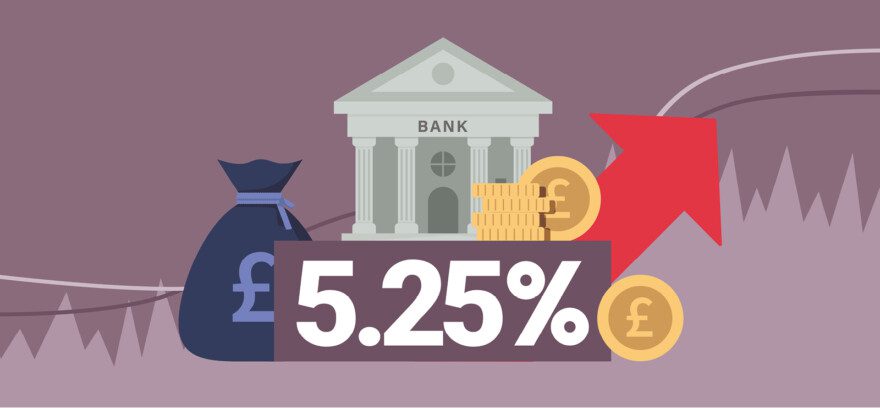UK markets pulled back this week with the FTSE 100 Index falling by 2% to trade at 7,540 points at the time of writing. The Bank of England raised interest rates by 0.25% to a 15 year high of 5.25% on Thursday and warned that borrowing costs are likely to remain elevated, despite slowing inflation.
Although inflation declined more than expected to 7.9% in June, the UK central bank’s Monetary Policy Committee cautioned that ‘it was too early to conclude that the economy was at or very close to a significant turning point’. The bank’s updated forecasts suggest that even if interest rates rise further, in line with recent market expectations, it will still take until mid-2025 for inflation to fall to the Bank of England’s 2% target.
It also said it expects GDP to remain steady at a quarterly pace of 0.2% in the near term, but to weaken as the effects of higher interest rates add up, though avoiding a recession.
UK house prices have recorded the largest annual drop in 14 years, as rising mortgage costs pile pressure on the property market, according to data from Nationwide. Prices for July fell 0.2% on the previous month and 3.8% compared with the same month last year, the largest fall since 2009, the Nationwide House price index showed.
The average cost of a home in the UK is now £260,828. House prices have come under increasing pressure as lenders have increased mortgage costs in response to the Bank of England’s continued interest rate rises.
Commodity markets
In the commodity markets, Brent crude futures traded around $85 per barrel on Friday and are set for their sixth weekly gain as Saudi Arabia and Russia, the world’s second and third-largest crude producers, pledged to cut output through next month.
Saudi Arabia’s statement on Thursday, to extend a voluntary oil production cut of 1 million barrels per day for another month to include September, came a day before OPEC and its allies, including Russia, are set to meet. Comments from Russian Deputy Prime Minister, Alexander Novak, that Russia will also cut its oil exports by 300,000 barrels per day in September, have raised concerns about supply and supported prices.
Responding to these announcements, White House national security spokesman, John Kirby, said the United States will continue to work with producers and consumers to ensure the energy market promotes growth. Even with the supply cuts, rising interest rates and a downturn in business activity has the market worried about demand.
Gold traded around $1,930 an ounce on Friday, and is set to end the week lower, pressured by a strong dollar and rising Treasury yields amid a series of solid US economic data this week.
Equity markets
US equity futures rose on Friday after a risk-off week, as investors digested the latest corporate earnings reports, while looking ahead to the key monthly jobs report due for release later today. In Thursday’s regular trading session, the Dow Jones Industrial Average lost 0.19%, the S&P 500 Index declined 0.25%, while the Nasdaq Composite fell 0.1%.
US job growth is forecast to have fallen to its lowest level since 2020, with the labour market slowly cooling, after almost 18 months of interest rate rises. Economists expect the economy to have added around 200,000 new non-farm jobs in July, according to Bloomberg. This would mark a further decline from 209,000 in June, and the slowest increase since December 2020, which could be taken as an encouraging sign that the Federal Reserve is making progress in its fight against inflation.
Meanwhile, the unemployment rate is seen steady at 3.6%, continuing to stay close to five decade lows. Wages are projected to have risen 0.3%, below 0.4% in June and annual pay growth is anticipated to slightly decrease to 4.2% from 4.4%.
Stocks retreated from recent highs earlier in the week after rating agency Fitch downgraded the United States’ credit rating to AA+ from AAA on Tuesday. Fitch cited fiscal deterioration over the next three years, and repeated debt ceiling negotiations that threaten the government’s ability to pay its bills, as reasons for the downgrade. The US narrowly avoided a default just weeks ago, with the federal borrowing limit lifted at the eleventh hour, after months of tension over spending cuts.
The information provided in this communication is not advice or a personal recommendation, and you should not make any investment decisions on the basis of it. If you are unsure of whether an investment is right for you, please seek advice. If you choose to invest, your capital may be at risk and the value of an investment may fall as well as rise in value, so you could get back less than you originally invested.
